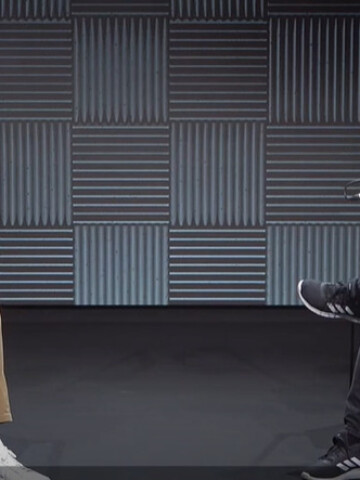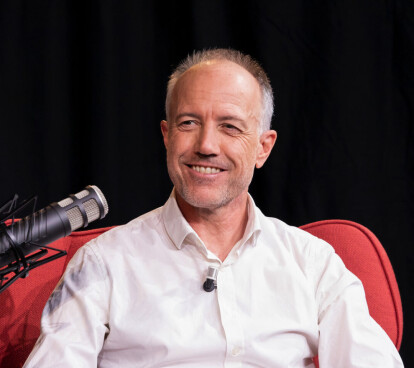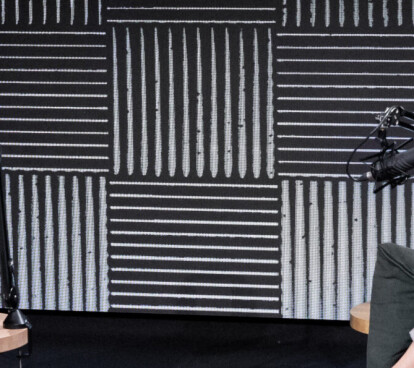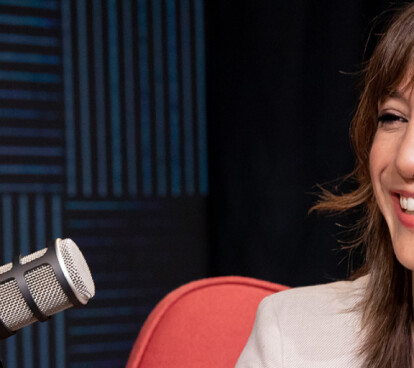
UNIQ conversation with Spanish advertising legend Toni Segarra
June 28, 2021
Toni Segarra is one of Spain’s most celebrated advertising executives. Spearheading campaigns for top brands like BMW and Ikea, he’s taken home dozens of major prizes at festivals in Cannes and San Sebastian and was named one of the 25 most influential people in Spain by Forbes. He also happens to be the architect of SNGULAR’s fresh brand update.
So, what better way to kick off UNIQ, our new transmedia conversations series, than by asking him some of the questions we care about most? Throughout this new series, José Manuel Calderón, former NBA player and current SNGULAR advisor, will be talking to other unique people who have risen to the heights of their diverse fields about how they face challenges in our rapidly changing world and what they’ve learned along the path to success. Here, Calderón chats with Segarra about talent, creativity and what all great teams have in common.
José Manuel Calderón: We’re called UNIQ because of one of your ideas. Could you tell us more about that? Do you think everyone should try to be unique?
Toni Segarra: I must say I’ve almost never had an idea alone. Our processes are long and involve a lot of collaboration, but yes, we did come up with UNIQ. It has to do with the idea of differentiation. As humans, we try to stand out from the others, with just a few exceptions. It happens in families. Kids all take on different roles to stand out to their parents. My work is to try to make brands stand out, to make them seem unique even if they are similar to others. Taking that to everyday life, it’s almost Darwinism. Everything seems to have the need to seem different to exist and be relevant.
How have consumption and consumers changed since you began your career in the 1980s? Do you think your most famous TV campaigns would still work today?
Advertising has changed everywhere. Before, we had one channel — television. That’s where everyone was. It was an anomaly, but that was our situation for around 50 years. It seemed normal then, but I think what we have now, with people accessing a huge range of content in thousands of different places, is more normal.
Audience fragmentation has changed everything. Before, reaching many people at once was simple. It also implied a different type of language and a way of being that no longer works. For instance, our BMW ad was designed for that specific TV environment. It was a moment of peace and reflection between hot dog commercials. Now that we have more segmentation, we need different approaches.
How do you think the pandemic has affected advertising?
We don’t know for sure, but there are sensibilities that we have to keep in mind. They’re always different and changing. Our work as differentiators means we have to be new, or appear to be new, with each action. Right now, segmentation is key. Decide who you’re talking to. Before, we had the absurd idea that we were talking to everyone. We’d put a tampon commercial in a basketball game, even if they were irrelevant to more than half of the audience.
Segmentation is inevitable and complex, but it makes sense to speak to the people you want to reach. Before, people listened to you no matter what. Now, the line between ad and content is increasingly blurred in the sense that advertisements have to be at least partially informative or interesting. You have to do what you can to get people to listen.
We’re seeing more and more decentralization, with, for example, YouTubers gaining huge followings. How can brands adapt to this new challenge?
Brands have to identify what they have that’s interesting. Indeed, someone talking about video games isn’t the same as a company selling mortgages. When we talk about content, I understand it as the audience. We have the temptation to think that the content is the final product, but it’s not. The final product is attracting people through content. It’s very important to first know your audience to understand how to speak to them.
First, brands have to create content to attract people. Red Bull is a great example of this. It’s turned into a synonym of extreme sports and adrenaline. They almost own their audience. Other brands even pay Red Bull to reach their audience.
Second, brands have to segment people and know where they are. It’s another art. Say you need people who would be interested in buying sneakers that look formal. Where are these people? Technology and algorithms help, but the paths are still complicated. What should I say? Who do I talk to? Where are they?
Do you think we’ll see artificial intelligence that writes advertisements any time soon?
I’m sure it already exists. I have the feeling that all these algorithms and data will elevate publicity, but it will eventually become the common denominator. Once the tools are cheap and easy enough, we’ll be on the same level and again, it will come back to outshining the rest. And that’s done with talent. Now, we’re still trying to figure out data and some people are ahead. But once it’s implemented, the game is 0-0 again. The excitement is when someone does something amazing. I think any work will depend on concentrating the most talent possible in the same place and working together. I still think that humans are above technology.
It’s like basketball. Talent, and especially getting talented people to work together on a team, is fundamental. Talent, and especially getting talented people to work together on a team, is key.
When you have a lot of talent, it’s not easy to have it work as an organism. At SNGULAR, we’ve talked a lot about organizations versus organisms. It’s like in sports. There are a lot of teams that are organizations and they’re fine, but they’re not operating as a living being. Once you have the talent, it’s key to make it work as one. A player can be great on one team, but not another. Sports show us that very clearly.
Teams have to follow rules, but they also have to know how to improvise. It’s about adapting to the environment. I think that companies with bureaucratic structures can’t improvise when they need to.
I think speed is the fundamental factor in today’s market. These organizations made more sense when things were slower, when you could plan more, when the world was clearer. In advertising, it was clear what we had to do with TVs. Today, the world should look more like a football or basketball match. You have to react immediately. I’m fascinated by the questions of leadership and organizing talent in this environment.
In basketball, I’ve found that knowing your teammates and being able to anticipate how they’ll react in these rapidly changing situations is key.
I’m obsessed with the idea of direction. I’ve told clients that I can’t work with them if they don’t know where they’re going. The world is fast and there are so many short-term goals. Take companies listed on the stock market for example. Each quarter they have to report and grow each day. Zara’s Amancio Ortega once told me he checks how sales are doing every single day. But longer-term goals matter. It’s already hard enough to react fast enough to what’s happening. If you’re in a boat and a storm comes, it’s tough, but it’s so much worse if you don’t have a destination. In advertising, you have to adapt extremely fast. Today, there are so many messengers, channels and people in the middle that, if the message gets diluted or fragmented, so does the brand. Brands have never stopped being people’s perceptions. That’s why it’s so important, now more than ever, to have a clear direction.
And that’s for the team too. People want to work together if they know what they’re doing and why. How do you manage the creativity of everyone on your team?
I often say it as a joke, but it’s also serious: my work consists of the management of feelings. I direct a team with a lot of brilliant people, a lot of talent. But they’re sensitive, there’s a lot of ego, vanity, etc. It comes with the business. But I’ve always thought a defining characteristic of great talent, the kind that works well in teams, is generosity. I’ve found that highly talented people admire the talent of others and they’re more generous, they give more away. That’s because they don’t question their talent. They don’t have to work hard to seem talented because it’s evident. Meanwhile, there are experts at pretending to be talented, especially in organizations. Organisms lie less. In organisms, life emerges naturally. In organizations, some people are highly skilled at creating discourses that make them seem more relevant than they are. It’s also a question of natural leadership. People need to understand who is leading and why. I think a good leader is someone who has demonstrated that they know what they’re doing.
How do you go about identifying talent?
The famous chef Ferran Adrià said recognizing talent and developing it is exactly like love. It’s inexplicable, but there it is. People have asked me how I’ve hired people because I have a quite eclectic team that works really well together. I’ve never known how to explain it. It is like falling in love or seeing someone who you want to be friends with. You kind of just know.
Now that the Olympics are on, the Spanish team has three medals but has always lost to the US. Who do you think would win in the Olympic games of marketing?
The United States wins. It has to do with the volume. We’re talking about consumption 一 buying and selling. No one buys and sells like Americans. It’s a huge market and there are so many people working in marketing. Most of the advertising there is horrible... but what’s good, is amazing. It’s also a pioneering market. Now, they have the technology. I don’t know the Chinese market as well, but I don’t think it’s even close to the US in terms of competition, differentiation, and so on. The US is a free capitalist market and China doesn’t have the same approach. Different countries have their strengths. Argentinians are amazing at telling mundane stories and connecting them. The British are the most clever and sophisticated. Spanish people are great at improvising. Something new pops up and we know how to use it immediately. We are fast and have high quality. The Nordic countries have a unique sense of humor and they know how to use it well. Asian markets like Japan also have very exciting ways of telling stories.
What has inspired you in your career?
I think you learn by copying. I spent many years copying the Americans and the Brits. Then you reach a point when you find your own voice. Once you know your strengths and weaknesses, you can cultivate a more personal style. And still, if I still see something I like, I’ll try to copy it. That’s how I learn.
It’s the same in basketball. I grew up trying to copy my idols until eventually, my own style emerged.
I use basketball as an example a lot and now I know why. There is a series of things that need to become automatic. You can’t think about what you’re doing when playing. I think what I’ve done has been the same. I’ve had to automate certain qualities like writing or conceptualizing. And this has allowed me to develop my own personality. But, until you get the basics to come naturally, you can’t develop a style.
Our latest news
Interested in learning more about how we are constantly adapting to the new digital frontier?

Interview
August 24, 2022
No podemos vivir la vida que no queremos, eso es lo más inconfortable del mundo

Interview
August 24, 2022
Quien me quiera ganar se va a tener que desgastar

